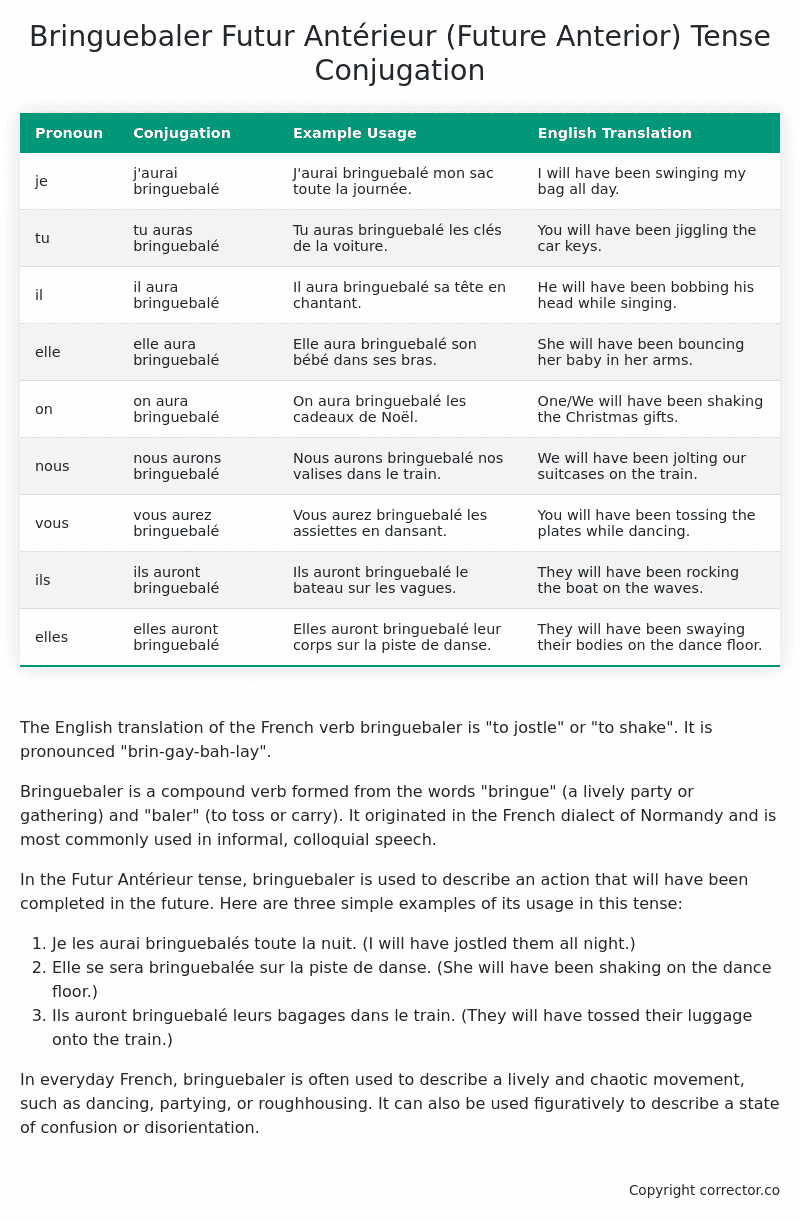Futur Antérieur (Future Anterior) Tense Conjugation of the French Verb bringuebaler
Introduction to the verb bringuebaler
The English translation of the French verb bringuebaler is “to jostle” or “to shake”. It is pronounced “brin-gay-bah-lay”.
Bringuebaler is a compound verb formed from the words “bringue” (a lively party or gathering) and “baler” (to toss or carry). It originated in the French dialect of Normandy and is most commonly used in informal, colloquial speech.
In the Futur Antérieur tense, bringuebaler is used to describe an action that will have been completed in the future. Here are three simple examples of its usage in this tense:
- Je les aurai bringuebalés toute la nuit. (I will have jostled them all night.)
- Elle se sera bringuebalée sur la piste de danse. (She will have been shaking on the dance floor.)
- Ils auront bringuebalé leurs bagages dans le train. (They will have tossed their luggage onto the train.)
In everyday French, bringuebaler is often used to describe a lively and chaotic movement, such as dancing, partying, or roughhousing. It can also be used figuratively to describe a state of confusion or disorientation.
Table of the Futur Antérieur (Future Anterior) Tense Conjugation of bringuebaler
| Pronoun | Conjugation | Example Usage | English Translation |
|---|---|---|---|
| je | j’aurai bringuebalé | J’aurai bringuebalé mon sac toute la journée. | I will have been swinging my bag all day. |
| tu | tu auras bringuebalé | Tu auras bringuebalé les clés de la voiture. | You will have been jiggling the car keys. |
| il | il aura bringuebalé | Il aura bringuebalé sa tête en chantant. | He will have been bobbing his head while singing. |
| elle | elle aura bringuebalé | Elle aura bringuebalé son bébé dans ses bras. | She will have been bouncing her baby in her arms. |
| on | on aura bringuebalé | On aura bringuebalé les cadeaux de Noël. | One/We will have been shaking the Christmas gifts. |
| nous | nous aurons bringuebalé | Nous aurons bringuebalé nos valises dans le train. | We will have been jolting our suitcases on the train. |
| vous | vous aurez bringuebalé | Vous aurez bringuebalé les assiettes en dansant. | You will have been tossing the plates while dancing. |
| ils | ils auront bringuebalé | Ils auront bringuebalé le bateau sur les vagues. | They will have been rocking the boat on the waves. |
| elles | elles auront bringuebalé | Elles auront bringuebalé leur corps sur la piste de danse. | They will have been swaying their bodies on the dance floor. |
Other Conjugations for Bringuebaler.
Le Present (Present Tense) Conjugation of the French Verb bringuebaler
Imparfait (Imperfect) Tense Conjugation of the French Verb bringuebaler
Passé Simple (Simple Past) Tense Conjugation of the French Verb bringuebaler
Passé Composé (Present Perfect) Tense Conjugation of the French Verb bringuebaler
Futur Simple (Simple Future) Tense Conjugation of the French Verb bringuebaler
Futur Proche (Near Future) Tense Conjugation of the French Verb bringuebaler
Plus-que-parfait (Pluperfect) Tense Conjugation of the French Verb bringuebaler
Passé Antérieur (Past Anterior) Tense Conjugation of the French Verb bringuebaler
Futur Antérieur (Future Anterior) Tense Conjugation of the French Verb bringuebaler (this article)
Subjonctif Présent (Subjunctive Present) Tense Conjugation of the French Verb bringuebaler
Subjonctif Passé (Subjunctive Past) Tense Conjugation of the French Verb bringuebaler
Subjonctif Imparfait (Subjunctive Imperfect) Tense Conjugation of the French Verb bringuebaler
Conditionnel Présent (Conditional Present) Tense Conjugation of the French Verb bringuebaler
Conditionnel Passé (Conditional Past) Tense Conjugation of the French Verb bringuebaler
L’impératif Présent (Imperative Present) Tense Conjugation of the French Verb bringuebaler
L’infinitif Présent (Infinitive Present) Tense Conjugation of the French Verb bringuebaler
Struggling with French verbs or the language in general? Why not use our free French Grammar Checker – no registration required!
Get a FREE Download Study Sheet of this Conjugation 🔥
Simply right click the image below, click “save image” and get your free reference for the bringuebaler Futur Antérieur tense conjugation!

Bringuebaler – About the French Futur Antérieur (Future Anterior) Tense
Construction
Common Everyday Usage Patterns
Interactions with Other Tenses
For example
Summary
I hope you enjoyed this article on the verb bringuebaler. Still in a learning mood? Check out another TOTALLY random French verb conjugation!


